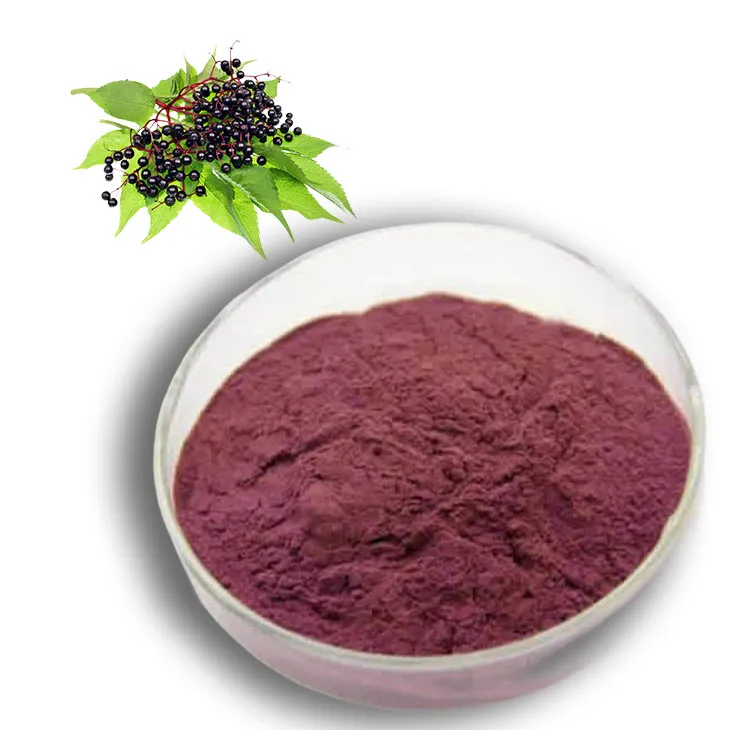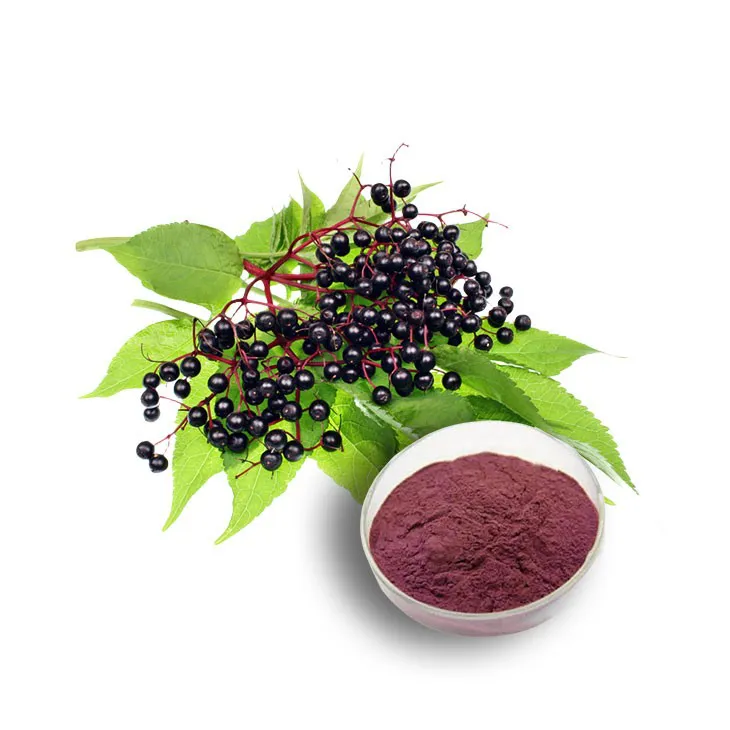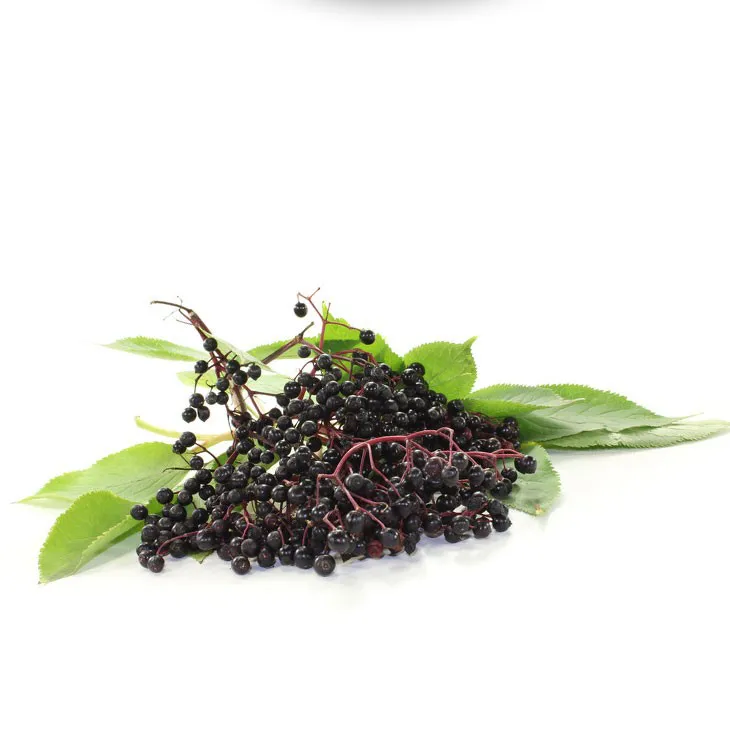- 0086-571-85302990
- sales@greenskybio.com
Best Answers to 7 Key Questions about Elderberry Extract.
2024-12-18

1. What is Elderberry Extract?
Elderberry Extract is a concentrated form of the elderberry plant (Sambucus nigra). It is typically made by extracting the beneficial compounds from the berries, often through processes like maceration, decoction, or using solvents in a more industrial setting. Elderberries are rich in various nutrients and bioactive substances. They contain vitamins such as vitamin C, which is known for its antioxidant properties. Additionally, elderberries have flavonoids, anthocyanins, and phenolic acids. These components contribute to the potential health benefits associated with Elderberry Extract.

2. What are the Potential Health Benefits?
Immune System Support
Elderberry extract is often touted for its ability to support the immune system. Studies suggest that the flavonoids and anthocyanins in elderberries may enhance the production of cytokines, which are proteins involved in the immune response. This can potentially help the body fight off infections more effectively. For example, during the cold and flu season, some people use elderberry extract as a natural remedy to reduce the severity and duration of symptoms.Antioxidant Activity
The antioxidants in elderberry extract play a crucial role in protecting the body from oxidative stress. Oxidative stress occurs when there is an imbalance between free radicals and antioxidants in the body. Free radicals can damage cells and contribute to various health problems, including aging, heart disease, and certain cancers. Elderberry's antioxidant content, such as vitamin C and flavonoids, helps neutralize these free radicals, reducing the risk of cellular damage.Anti - Inflammatory Effects
Some research indicates that elderberry extract may have anti - inflammatory properties. Inflammation is a natural response in the body, but chronic inflammation can lead to a host of health issues. The phenolic acids and flavonoids in elderberry may help reduce inflammation by inhibiting certain enzymes and signaling molecules involved in the inflammatory process. This could potentially be beneficial for conditions such as arthritis or inflammatory bowel disease.
3. How is Elderberry Extract Consumed?
Elderberry extract can be consumed in several ways:
- As a Syrup: Elderberry syrup is a popular form. It is often sweetened and flavored, making it more palatable. This can be taken directly by the spoonful, usually 1 - 2 teaspoons daily for general health maintenance. During illness, the dosage may be increased according to the product instructions or a healthcare provider's advice.
- In Capsules or Tablets: These are a convenient option for those who prefer a more standardized dosage. Capsules typically contain a measured amount of the elderberry extract powder. It is important to follow the recommended dosage on the product label.
- As a Tincture: Elderberry tincture is an alcohol - based extract. A few drops can be added to water or juice and consumed. However, tinctures may have a strong taste due to the alcohol content.

4. Are There Any Side Effects?
While elderberry extract is generally considered safe for most people when consumed in moderation, there can be some side effects:
- Gastrointestinal Issues: Some individuals may experience mild stomach upset, nausea, or diarrhea. This is more likely to occur if a large amount of elderberry extract is consumed at once or if a person has a sensitive stomach.
- Allergic Reactions: Although rare, some people may be allergic to elderberries. Allergic symptoms can include skin rashes, itching, swelling, and in severe cases, difficulty breathing. If any signs of an allergic reaction occur after consuming elderberry extract, medical attention should be sought immediately.
5. Can Elderberry Extract Interact with Medications?
There is a potential for interactions between elderberry extract and certain medications:
- Immunosuppressant Medications: Since elderberry extract may boost the immune system, it could potentially interfere with immunosuppressant drugs. For example, for those who have had an organ transplant and are taking medications to prevent organ rejection, using elderberry extract without medical supervision could be risky as it may counteract the effects of the immunosuppressants.
- Diabetes Medications: Elderberry extract may lower blood sugar levels. If a person with diabetes is taking medications to control their blood sugar, combining it with elderberry extract could cause hypoglycemia (low blood sugar). Therefore, close monitoring of blood sugar levels is necessary if using both the extract and diabetes medications.
6. How to Choose a High - Quality Elderberry Extract?
When selecting an elderberry extract, consider the following factors:
- Source of the Elderberries: Look for products that use high - quality, organically grown elderberries. The source of the berries can affect the purity and potency of the extract. For example, elderberries grown in clean, unpolluted environments are likely to have fewer contaminants and higher nutrient content.
- Extraction Method: Different extraction methods can yield different results. Maceration and decoction are more traditional methods that can preserve many of the beneficial compounds. However, some modern extraction techniques using solvents can also be effective if done properly. Check the product label or manufacturer's information to understand the extraction method used.
- Concentration and Standardization: A good elderberry extract should be properly concentrated and standardized. This ensures that each dose contains a consistent amount of the active ingredients. Look for products that indicate the concentration of key components such as anthocyanins or flavonoids.
- Additives and Preservatives: Some elderberry extracts may contain additives such as sweeteners, flavors, or preservatives. If possible, choose a product with minimal additives, especially if you have sensitivities or prefer a more natural product.
- Reputation of the Brand: Research the brand's reputation. Look for brands that have a history of producing high - quality herbal products. Customer reviews and ratings can also be a useful source of information to gauge the quality of the elderberry extract.
7. Is Elderberry Extract Suitable for Everyone?
Elderberry extract is not suitable for everyone:
- Children: While elderberry extract can be beneficial for children in some cases, such as during a cold or flu, it should be given in appropriate dosages according to their age and weight. Children may also be more sensitive to the side effects, so it is important to consult a pediatrician before giving them elderberry extract.
- Elderly or Immunocompromised Individuals: These individuals may have a more delicate immune system. While elderberry extract can support the immune system, it should be used with caution and under medical supervision. In some cases, such as for those with severe immune deficiencies, it may not be the appropriate choice without careful consideration of potential risks and benefits.
- People with Specific Medical Conditions: As mentioned earlier, those with diabetes or on immunosuppressant medications need to be especially cautious. Additionally, people with autoimmune diseases may need to avoid elderberry extract, as its immune - boosting properties could potentially exacerbate their condition.
FAQ:
Question 1: What is Elderberry Extract?
Elderberry extract is a concentrated form derived from the berries of the elderberry plant. It contains various bioactive compounds such as anthocyanins, flavonoids, and phenolic acids. These components are believed to contribute to its potential health - promoting properties.
Question 2: What are the potential health benefits of Elderberry Extract?
Elderberry extract is often associated with several potential health benefits. It may help boost the immune system, potentially reducing the severity and duration of colds and flu. Some studies also suggest it has antioxidant properties, which can protect cells from damage caused by free radicals. Additionally, it may have anti - inflammatory effects in the body.
Question 3: How is Elderberry Extract typically consumed?
Elderberry extract can be consumed in different forms. It is available as syrups, capsules, and tinctures. The syrup form is a popular choice, especially for those looking to support their immune system during the cold and flu season. It can be taken directly or mixed with water or other beverages. Capsules are convenient for those who prefer a more traditional supplement form, and tinctures are often used in herbal medicine preparations.
Question 4: Are there any side effects of Elderberry Extract?
While elderberry extract is generally considered safe for most people when consumed in appropriate amounts, some individuals may experience side effects. These can include nausea, vomiting, and diarrhea, especially if consumed in excessive quantities. Also, unripe or uncooked elderberries contain substances that can be toxic, so it's important to ensure that the extract is made from properly processed berries.
Question 5: Can Elderberry Extract interact with medications?
Yes, Elderberry extract may interact with certain medications. For example, it could potentially interact with immunosuppressant drugs as it has immune - boosting properties. It may also interact with diuretics. If you are taking any medications, it is advisable to consult your healthcare provider before starting to take elderberry extract.
Question 6: How should Elderberry Extract be stored?
Elderberry extract should be stored according to the instructions on the product label. In general, it should be kept in a cool, dry place, away from direct sunlight. If it is in liquid form, such as a syrup, it may need to be refrigerated after opening to maintain its freshness and potency.
Related literature
- The Health Benefits of Elderberry Extract: A Comprehensive Review"
- "Elderberry Extract: Composition, Pharmacological Activity, and Clinical Applications"
- "Safety and Efficacy of Elderberry Extract in Human Health"
- ▶ Hesperidin
- ▶ Citrus Bioflavonoids
- ▶ Plant Extract
- ▶ lycopene
- ▶ Diosmin
- ▶ Grape seed extract
- ▶ Sea buckthorn Juice Powder
- ▶ Fruit Juice Powder
- ▶ Hops Extract
- ▶ Artichoke Extract
- ▶ Mushroom extract
- ▶ Astaxanthin
- ▶ Green Tea Extract
- ▶ Curcumin
- ▶ Horse Chestnut Extract
- ▶ Other Product
- ▶ Boswellia Serrata Extract
- ▶ Resveratrol
- ▶ Marigold Extract
- ▶ Grape Leaf Extract
- ▶ New Product
- ▶ Aminolevulinic acid
- ▶ Cranberry Extract
- ▶ Red Yeast Rice
- ▶ Red Wine Extract
-
Bayberry Extract
2024-12-18
-
White Willow Bark Extract
2024-12-18
-
Green Tea Extract
2024-12-18
-
Kupilu Extract
2024-12-18
-
Shikone Extract
2024-12-18
-
Ginger Extract
2024-12-18
-
Tamarind extract powder
2024-12-18
-
Hawthorn powder
2024-12-18
-
Okra Extract
2024-12-18
-
Hawthorn Extract
2024-12-18





















